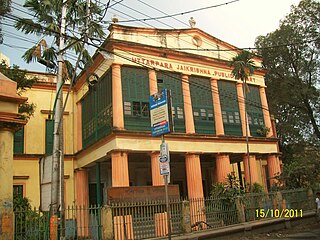
Hooghly district is one of the districts of the Indian state of West Bengal. It can alternatively be spelt Hoogli or Hugli. The district is named after the Hooghly River.

Paschimbanga Bangla Akademi is the official regulatory body of the Bengali language in West Bengal, India. Modeled after Bangla Academy of Bangladesh and France's Académie française, the Bangla Akademi was founded on 20 May 1986 in Kolkata to act as the official authority of the language and is entrusted with the responsibility of reforming Bengali spelling and grammar, compiling dictionaries, encyclopedias and terminologies and promoting Bengali language and culture in West Bengal. Though the Akademi has no enforcement power over their rules and regulations, yet they are widely accepted by the Governments of West Bengal and Tripura as well as a considerable number of private publishing houses and institutions like the Oxford University Press and the Ramakrishna Mission.
Arambagh is a town and a municipality in Hooghly district in the state of West Bengal, India. It is the headquarters of Arambagh subdivision.
Patuli is a village under Purbasthali police station of Kalna subdivision in Purba Bardhaman district in the Indian state of West Bengal.
Kamarpukur is a village in the Goghat II CD block in the Arambag subdivision of the Hooghly District in West Bengal state of India. It is the birthplace of Sri Ramakrishna. It is the block headquarters of the Goghat –II community development block.

Midnapore Collegiate School, formerly Governmental Zilla School, established on 14th November 1834, is one of the oldest schools in Bengal as well as India. The students and teachers of this school made contributions to Indian Freedom Movement during the British Rule. Kshudiram Bose, a martyr in the freedom struggle was one of the students of the school. Some other alumni of the institution are Bankim Chandra Chattopadhyay, Manik Bandopadhyay. Brahmo Samaj leader Wrishi Rajnarayan Basu as headmasters had also contributed in building up the institution. It was formerly the Zilla School of Midnapore in West Bengal. The school campus has a basketball court and science labs.

Prafulla Chandra Sen was an Indian politician and freedom fighter. He was the Chief Minister of West Bengal from 1962 to 1967.

Ajoy Kumar Mukherjee was an Indian independence activist and politician who served three short terms as the fourth and sixth Chief Minister of West Bengal. He hailed from Tamluk, Purba Medinipur district, West Bengal.

The University of Burdwan is a public university in Purba Bardhaman, West Bengal, India. It was established by the West Bengal Government as a teaching and affiliating university on 15 June 1960 with six graduate departments and 30 undergraduate colleges spread over three districts that come under the jurisdiction of the university. The university currently offers more than 30 undergraduate and 66 postgraduate courses.
Arambag subdivision is an administrative subdivision of the Hooghly district in the Indian state of West Bengal.
Sushil Kumar Dhara was a revolutionary in British India and a political leader after Indian Independence in 1947.
Uchalan is a village in Raina II CD block in Bardhaman Sadar South subdivision of Purba Bardhaman district in West Bengal, India.
Rabiranjan Chattopadhyay was an Indian politician and the erstwhile Minister for the departments of Technical Education and Training, Science and Technology and Biotechnology in the Government of West Bengal. He was also an MLA, elected from the Bardhaman Dakshin constituency in the 2011 West Bengal state assembly election.
Arambagh is a community development block that forms an administrative division in Arambag subdivision of Hooghly district in the Indian state of West Bengal.
Tarakeshwar is a panchayat samiti in Chandannagore subdivision of Hooghly district in the Indian state of West Bengal.

Uttarpara Jaykrishna Public Library is a district library in Uttarpara, West Bengal, India, and is the first of its kind in Asia. Located in Uttarpara, a small town on the banks of the Hoogly river, this library was established by Babu Jaykrishna Mukherjee and opened to the public in 1859. At present, the library has been declared a Group ‘A’ Library by the West Bengal State Government. Efforts are being made to have it declared an Institution of National Importance.

Netaji Mahavidyalaya, also known as Kalipur College, is one of the oldest colleges in Arambagh, in the Hooghly district, West Bengal, India. It offers undergraduate courses in Arts, Commerce and Sciences. It is affiliated to University of Burdwan. It was established in 1948.
The 1933 New Year Honours were appointments by King George V to various orders and honours to reward and highlight good works by citizens of the United Kingdom and British Empire. They were announced on 30 December 1932.

Khudiram Das was an Indian scholar, educationist, critic, litterateur, an authority on Rabindra literature and linguistic expert.
Nirupam Sen was a Bengali Marxist political leader and former Commerce and Industries minister of the Government of West Bengal.








